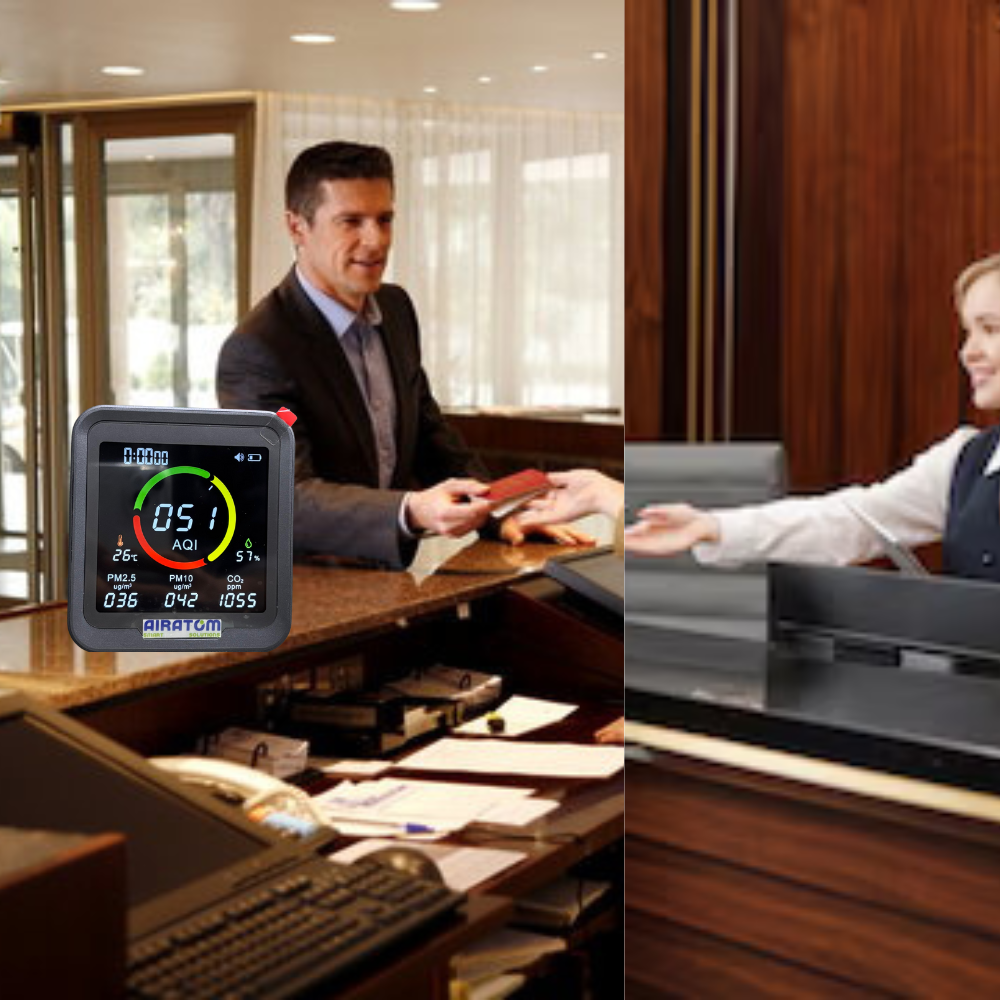Paid the X amount for staying as per the 5-star rating for hygiene, cleanliness, services, support, beautifully designed interiors, and an excellent outside view. But what do you face after a short-term stay? Sore throat? Cough? Or some chest tightness? How does this sound as a hotel owner or manager who deals with such a situation? Nobody wants to live in a place where you are offering all the services, but the air is dry and heavy to breathe! What to consider here? The indoor air quality in your Hotels!
Air quality in hotels is one of the biggest problems most hotels neglect, and it affects not just your guests but your business too. Because air quality monitoring indoors is not a new trend, it’s a necessity that should be offered by every hotel or homestay. Not anymore! You can now look for the perfect solutions based on the air quality conditions inside your hotel rooms. But you must be wondering — how is it possible to get the best solution to improve indoor air quality in hotels?
Airatom smart solution is here to get you in check, because making the invisible visible is our core motto, and eliminating pollutants from your air is our dutiful responsibility. So, read this entire blog to understand first how indoor air quality in hotels can affect your guests’ experience, your ratings, and ultimately, your business. Then, discover the advanced, top-notch solutions that are not just simple ideas — but practical systems that actually work in removing pollutants from the air.
80% of Travellers Disrupted by Odours
A 2025 report found that 80% of travelers experienced discomfort from odors inside hotel rooms. Think of that — 8 out of 10 people who stay at a hotel are affected by something as basic and essential as air.
And guess what? That discomfort turns into complaints, and complaints turn into bad reviews — which leads to damaged ratings and lost customers. And we all know, in today’s world, one bad online review can cost you thousands.
Why Indoor Air Quality Is More Important For Your Hotel Business Than You Think?
1. Better Guest Reviews Lead to More Bookings
Today, guests notice everything as from the scent of the room to how fresh it feels when they walk. And if the air feels dry, stuffy, or smells of strong chemicals, they will mention it in their review. This one small thing can bring down your overall rating. Clean air becomes the silent reason people give you 5 stars.
2. Happy Guests Come Back and Recommend You
Good air leads to good sleep. And good sleep leads to a good mood. If a guest feels truly comfortable in your hotel, especially after a long journey or a busy day, they are more likely to return again. Guests also remember how your rooms made them feel.
3. Fewer Complaints Means Less Pressure on Staff
Bad odors, damp smells, or heavy air in a room often lead to unnecessary complaints. Guests might ask for a room change or call housekeeping, and your staff ends up spending more time handling the issue instead of focusing on providing a good experience. When the air quality is consistently clean and pleasant, guests stay happy and quiet.
4. Healthier Environment Builds Guest Trust
Guests expect your hotel to be safe and clean, not just in terms of hygiene but also the air they breathe. Dry throats, sneezing, headaches, or allergic reactions during a hotel stay can make them doubt the cleanliness of the space. By improving air quality, you’re not just offering a place to sleep, but a place to feel well.
5. Clean Air Adds Value to Your Hotel Brand
People don’t just stay in hotels anymore, they choose experiences. When you include clean air as part of your guest experience, it becomes something that sets your brand apart from others. Instead of just saying “clean rooms,” you can now say “fresh air guaranteed.”
6. Smart Air Systems Save Costs and Maintenance Time
Investing in air quality may sound like a big step, but it actually helps you save money in the long run. Prana Air machines are made for 24/7 use with very low power consumption. That means you can keep your rooms fresh all day without worrying about high energy bills.
The Smartest Way to Improve Hotel Air Quality Without Changing Everything:
Now that we’ve understood how poor air quality can affect your guests and your hotel business, let’s talk about the real fix. And no, you don’t need to go room by room placing separate air purifiers. That’s not practical and definitely not smart for a hotel.
Airatom smart solution offers you a complete, centralized solution — one that works quietly in the background and keeps every corner of your hotel breathing clean.

1. Air Quality Monitor to Keep You in Control
You can’t improve what you can’t see, and air is invisible. That’s why our smart air quality monitor is the first step. It tracks everything from PM2.5 and PM10 to CO₂, temperature, and humidity levels. You can install these monitors in guest room corridors, restaurants, spas, conference rooms, and even the gym. It gives you real-time data, so you always know what the air quality is like in every part of your hotel.
2. Fresh Air Machine That Works With Your AHU
Instead of placing air purifiers everywhere, our fresh air machine connects directly with your existing AHU (Air Handling Unit). Once installed, it starts supplying filtered, clean, and breathable air throughout your hotel — in every room, every hallway, and every public space connected to the system.
This means:
One solution serves the entire building
There’s no noise or equipment lying around in guest rooms
Your interiors stay untouched and beautiful
Guests enjoy clean air without even realizing it
3. Electrostatic Filter That Keeps the Return Air Clean
The air inside your hotel doesn’t just come from outside, it recirculates. That means dust, germs, and pollutants can keep cycling unless you stop them. That’s where our electrostatic filter comes in.
Installed in the return air path of your AHU, this filter traps particles, dust, and bacteria before the air goes back into circulation. So even the air that’s returning gets cleaned again. This keeps your indoor air consistently fresh and safe to breathe


